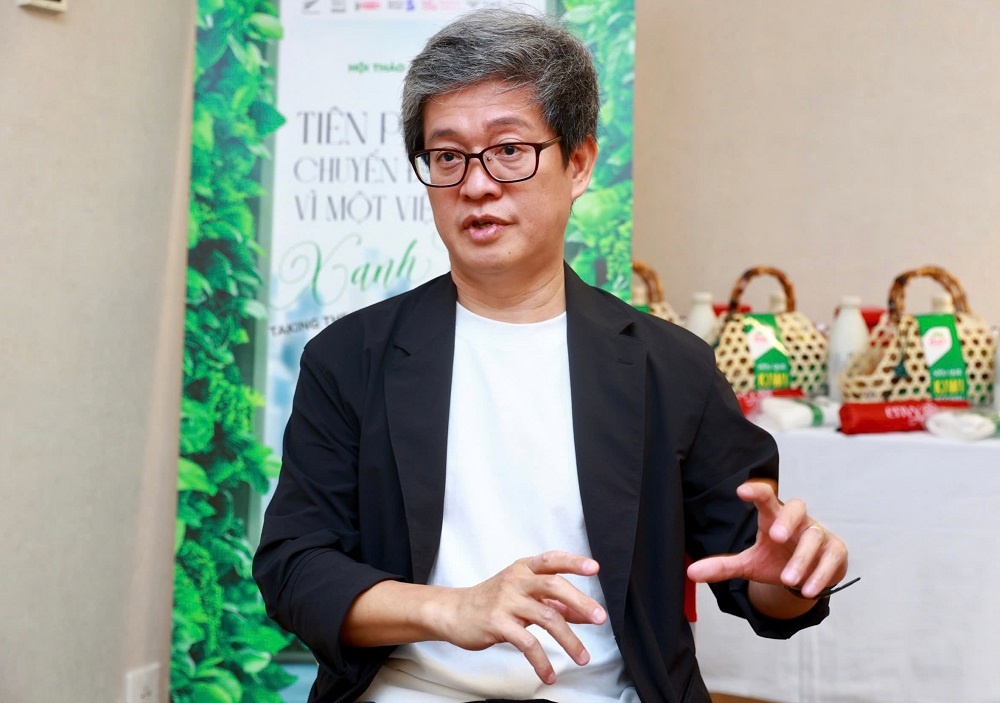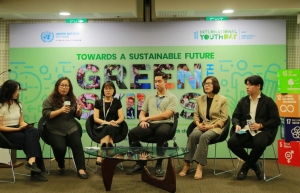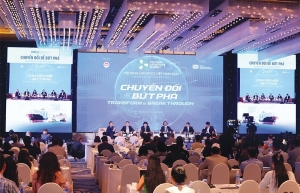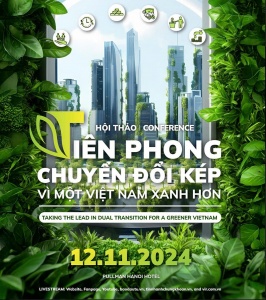Green consumption trends on the rise in Vietnam
At a conference themed "Taking the Lead in Dual Transition for a Greener Vietnam" hosted by VIR on November 12, Le Minh Trang, associate director of retail measurement services at NielsenIQ (NIQ), shared her insights on green consumption trends in Vietnam.
According to the NielsenIQ Consumer Outlook and Expectation 2024 study in Vietnam, 16 per cent of Vietnamese consumers have incorporated sustainable futures into their long-term priorities, while 24 per cent are focusing on sustainable lifestyles in their short-term plans.
 |
| Le Minh Trang, associate director of retail measurement services at NielsenIQ |
"Green consumption in Vietnam is making encouraging strides as consumers become increasingly concerned about sustainability," said Trang.
The sectors most impacted by green consumption trends in Vietnam include food and beverages, personal care, fast-moving consumer goods, and consumer electronics. "Consumers are increasingly prioritising organic products, environmentally friendly packaging, and energy-efficient devices," Trang emphasised.
Adopting green production strategies has brought significant business benefits for companies. As Trang noted, 42 per cent of consumers in Asia-Pacific consider it very important for businesses to actively reduce their environmental impacts, and 34 per cent regard it as an important factor. These benefits include increased customer loyalty, improved profit margins through cost savings, enhanced brand image, and expanded export opportunities.
"Transitioning to green production helps businesses reduce long-term costs by optimising energy, raw materials, and reducing waste, thereby improving profit margins. Moreover, companies also benefit from improved brand image and competitive advantages in the market," Trang added.
However, businesses will face greater pressure from consumers and environmental regulations in the next five years. Lack of supporting technology, high production costs, difficulty in prioritising investments, and a lack of transparency in the supply chain are major issues that need to be addressed. Additionally, the absence of standards and harmonisation also reduces the motivation for SMEs to implement changes.
According to a recent NIQ report on SMEs, 17 per cent of companies in Asia-Pacific derive their product value from healthy and nutritious products, while 12 per cent come from sustainable and environmentally friendly products, on par with the global average. In this context, SMBs are facing a number of challenges and opportunities in adopting sustainable business strategies.
"One of the biggest challenges that SMEs face is the lack of scalable technology. Many small businesses struggle to access the necessary technology to implement sustainable solutions, making it difficult to capitalise on the benefits of technological innovations," Trang said.
Nevertheless, SMEs also face many opportunities, such as the development of advanced technologies, the trend towards renewable energy, and pressure from consumers and regulations. "Business model innovation is the key for these companies to enhance their competitiveness and achieve long-term sustainable growth," Trang added.
According to Trang, to capitalise on these opportunities, businesses need to proactively adapt to green consumption trends. First, they need to actively monitor legal regulations, effectively manage their supply chains, and proactively manage risks. Investing in independent certifications, community collaborations, and avoiding excessive price increases for sustainable products are also important steps.
Additionally, businesses should not overprice sustainable products, as unreasonable price hikes may dampen consumer interest. Instead, companies need to substantiate their claims with concrete evidence. Trang also said that businesses that quickly adapt and transition to sustainable models will gain a competitive advantage in the market, while also contributing to a greener and more sustainable future.
In alignment with Vietnam's Net Zero commitment at COP26, REPEET is actively taking strategic actions to reduce carbon emissions, protect the environment, and minimise resource exploitation.
REPEET is making waves in sustainable fashion by replacing petroleum-based polyester with recycled polyester fibres sourced domestically. The brand has established a comprehensive supply chain involving collection, classification, recycling, and production, which has contributed to a 57 per cent reduction in carbon emissions and a 70 per cent saving in water usage.
 |
| Vang Vien Thong, CEO and founder of REPEET |
"By using 10 tonnes of REPEET fabric, we have recycled nearly 1.45 million PET plastic bottles, reducing carbon emissions equivalent to a car travelling 57,000 km and saving 70,000 litres of water," said Vang Vien Thong, CEO and founder of REPEET. "Pioneering plastic waste recycling into sustainable garment products in Vietnam not only benefits the environment but also establishes a new business model that supports the global textile industry’s sustainability goals," he added.
Vietnam, a leading global textile and garment exporter, REPEET continues to demonstrate its unlimited potential in the industry. With a strategic commitment to sustainability, REPEET is not only conquering the domestic market but also successfully expanding into demanding international markets such as Japan, the United States, and Europe, where product quality and environmental sustainability criteria are consistently prioritised.
Beyond delivering high-quality products, REPEET is continuously investing in research and development of innovative recycling technologies, contributing to building a sustainable business model that benefits not just the company itself, but also its partners, fashion brands, and the broader trend of sustainable consumption.
 | 'Green skills vital' for green transition Organised by the United Nations in Vietnam on August 11, this year’s International Youth Day focussed on the role of education and highlighted the importance of teaching green skills to young people, so they can move towards a brighter, greener, and more sustainable future for Vietnam. |
 | Green is new buzzword for logistics arena As sustainable development becomes a mandate to operate in the logistics industry, companies are stepping up their efforts to green their operations. |
 | Taking the lead in dual transition for a greener Vietnam On November 12, VIR will host its annual sustainable development conference, with the presence of hundreds of leaders from ministries, international organisations, and domestic and foreign businesses pursuing digital and green transitions in Vietnam. |
 | Consumer beverage trends must be taken into account The alcoholic beverage market in Vietnam is undergoing a significant transformation due to new consumer trends and particularly the enforcement of stricter concentration policies. Le Minh Trang, associate director of the Retail Measurement Service at NielsenIQ (NIQ) Vietnam, talked to VIR’s Hoang Oanh. |
What the stars mean:
★ Poor ★ ★ Promising ★★★ Good ★★★★ Very good ★★★★★ Exceptional
Related Contents
Latest News
More News
- Trung Nam-Sideros River consortium wins bid for LNG venture (January 30, 2026 | 11:16)
- Vietnam moves towards market-based fuel management with E10 rollout (January 30, 2026 | 11:10)
- Envision Energy, REE Group partner on 128MW wind projects (January 30, 2026 | 10:58)
- Vingroup consults on carbon credits for electric vehicle charging network (January 28, 2026 | 11:04)
- Bac Ai Pumped Storage Hydropower Plant to enter peak construction phase (January 27, 2026 | 08:00)
- ASEAN could scale up sustainable aviation fuel by 2050 (January 24, 2026 | 10:19)
- 64,000 hectares of sea allocated for offshore wind surveys (January 22, 2026 | 20:23)
- EVN secures financing for Quang Trach II LNG power plant (January 17, 2026 | 15:55)
- PC1 teams up with DENZAI on regional wind projects (January 16, 2026 | 21:18)
- Innovation and ESG practices drive green transition in the digital era (January 16, 2026 | 16:51)

 Tag:
Tag:




















 Mobile Version
Mobile Version